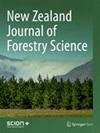光照强度和密封类型对大叶桉×桉树离体伸长和不定根的影响
IF 1.5
4区 农林科学
Q2 FORESTRY
引用次数: 0
摘要
背景:通过微繁殖使组织返老还童/重新焕发活力已成为桉树物种克隆繁殖的重要工具。本研究评估了光异养生物(即光照强度和密封类型)对离体伸长和不定根的影响,以确定大叶桉×欧斑桉(E. urophylla)杂交种离体培养的限制因素:方法:收集在半水培系统中生长的小型树桩的节段(即外植体)。评估了光照强度和密封类型对体外伸长和不定根阶段的影响,光照强度和密封类型分别来自 40 μmol m-2 s-1 荧光灯和 20、40 和 80 μmol m-2 s-1 红/蓝 LED,有(通过多孔膜)和无气体交换:结果:根据 35 d 的结果,40 μmol m-2 s-1 荧光灯和气体交换的组合最适合大叶桉 × 尢菲拉桉的离体伸长和不定根。这两个因素都增加了桉树的活力、枝条长度、光合色素含量、木质部、韧皮部、气孔数量和密度、根的长度、直径、每个外植体的根数和不定根率:结论:光照强度和密封类型会影响桉树 × 尢菲拉的离体伸长和不定根。这些结果有助于通过微繁殖技术优化商业桉树物种的克隆。本文章由计算机程序翻译,如有差异,请以英文原文为准。
Effect of light intensity and seal type on the in vitro elongation and adventitious rooting of Eucalyptus grandis × E. urophylla
Background: Rejuvenation/reinvigoration of tissues through micropropagation has become an important tool for clonal propagation in eucalypts species. This study evaluated the effect of photomixotrophism (i.e., light intensity and seal type) on in vitro elongation and adventitious rooting to identify the limiting factors on in vitro culture of the Eucalyptus grandis × E. urophylla hybrid.
Methods: Nodal segments (i.e., explants) from ministumps grown in a semi-hydroponic system were collected. The effects of light intensity and seal type on in vitro elongation and adventitious rooting stages were evaluated from a 40 μmol m-2 s-1 fluorescent lamp and 20, 40, and 80 μmol m-2 s-1 red/blue LEDs, with (through porous membranes) and without gas exchange.
Results: Based on the results at 35 d, 40 μmol m-2 s-1 fluorescent lamp and gas exchange combination was the most suitable for in vitro elongation and adventitious rooting of Eucalyptus grandis × E. urophylla. Both factors increased the vigour, shoot length, photosynthetic pigment content, xylem, phloem, stomatal number and density, root length, diameter, number of roots per explant, and adventitious rooting fraction.
Conclusions: Light intensity and seal type influences the in vitro elongation and adventitious rooting of Eucalyptus grandis × E. urophylla. The results contribute to optimising the cloning of commercial eucalypts species by the micropropagation technique.
求助全文
通过发布文献求助,成功后即可免费获取论文全文。
去求助
来源期刊

New Zealand Journal of Forestry Science
FORESTRY-
CiteScore
2.20
自引率
13.30%
发文量
20
审稿时长
39 weeks
期刊介绍:
The New Zealand Journal of Forestry Science is an international journal covering the breadth of forestry science. Planted forests are a particular focus but manuscripts on a wide range of forestry topics will also be considered. The journal''s scope covers forestry species, which are those capable of reaching at least five metres in height at maturity in the place they are located, but not grown or managed primarily for fruit or nut production.
 求助内容:
求助内容: 应助结果提醒方式:
应助结果提醒方式:


